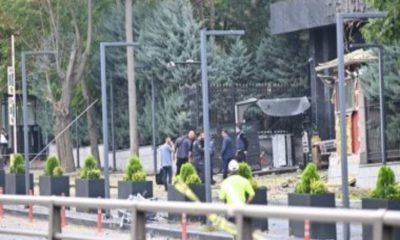In a major development to strengthen the iron fist of Turkish President Recep Tayyip Erdogan, a Turkish court has handed life sentences to 104 suspects over their involvement in the July 2016 attempted coup on Monday.
According to Turkish official Anadolu news agency, the former military personnel were given “aggravated life sentences” for “attempting to overthrow the constitutional order” by a court in the western province of Izmir. Such prison sentences, which replaced the death penalty, carry harsher conditions than normal life sentences in Turkey.
Among the suspects receiving life sentences include former air force chief of staff lieutenant general Hasan Huseyin Demiraslan and ex-Aegean army command chief of staff major general Memduh Hakbilen. In total, 280 military staff are on trial over the failed coup bid.
Read More: Turkey commemorates anniversary of failed Coup d’etat
The court gave 21 suspects a 20-year jail sentence for “assisting the assassination of the president” while 31 were given sentences between seven and half years and ten and half years for being a member of an armed “terror” group, the agency added.

There was an alleged plot to kill President Recep Tayyip Erdogan on the night of the coup while he was on holiday in the Aegean resort of Marmaris with his family. The president says he was saved by 15 minutes from the plot.
More than 240 people, most of them unarmed civilians, were killed on the night of July 15, 2016, when a group of rogue soldiers commandeered tanks and warplanes in an attempt to attack parliament and overthrow President Recep Tayyip Erdogan.
Erdogan government accuses the network of US-based Muslim religious leader Fethullah Gulen, a former ally of Erdogan, of ordering the failed coup. Gulen used to run several NGOs, schools, media houses and other public welfare activities. He denies involvement in the coup attempt. Gulen has lived in self-imposed exile in Pennsylvania since 1999.
Turkish authorities say the movement Gulen runs is a “terrorist” organization, claiming that its members have been running “a parallel state” within the civilian and military bureaucracy and following their own agenda.
Following the attempted coup, tens of thousands of people have been arrested and public workers have been sacked or suspended over alleged links to outlawed Gulen or Kurdish fighters under the state of emergency imposed in July 2016.
Since the coup attempt, authorities have detained 160,000 people and dismissed nearly the same number of civil servants as part of a sweeping crackdown, the U.N. human rights office said in March. Of that number, more than 50,000 have been formally charged and kept in jail pending trial.
Turkey’s Western allies fear the country is sliding further into authoritarianism under Erdogan and accuse the president of using the failed coup as a pretext to quash his opponents.
In the latest development, Turkish President Recep Tayyip Erdogan, while in Bosnian capital Sarajevo, said on Sunday that National Intelligence Organization has warned of an assassination plot against him.
He was quoted saying to reporters, “The reason I am here [now] is that I received this intelligence. Such threats and operations will not stop us from going forward. We will continue on our path,” he added.
Earlier on May 19, Turkish Deputy Prime Minister Bekir Bozdağ had warned of possible “assassination threats” against Erdoğan during his visit to Bosnia on May 20.
“We are aware that there are circles who are uncomfortable with such a great leader, a man with a cause. We are aware that they want to get rid of our president. These assassination threats are not new, they have always been there,” Bozdağ tweeted.





















